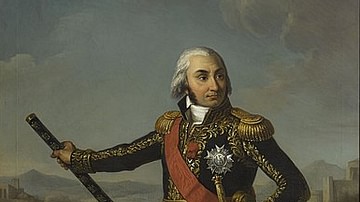Search
Search Results

Definition
St. Bartholomew's Day Massacre
The St. Bartholomew's Day Massacre was a widespread slaughter of French Protestants (Huguenots) by Catholics beginning on 24 August 1572 and lasting over two months, resulting in the deaths of between 5,000 and 25,000 people. It began in...

Definition
Henry VI of England
Henry VI of England ruled as king from 1422 to 1461 and again from 1470 to 1471. Succeeding his father Henry V of England (r. 1413-1422), Henry VI was crowned the king of France in 1431 but he could not prevent a French revival led by Charles...

Definition
Edmond Halley
Edmond Halley (1656-1742) was an English astronomer, mathematician, and cartographer. Halley's Comet is named after him since he accurately predicted its return in 1758. One of the early globetrotting scientists, Halley led several maritime...

Definition
Hector Berlioz
Hector Berlioz (1803-1869) was the leading French composer of Romantic music, best known for his innovative Symphonie fantastique and use of large-scale orchestras and choruses in works like The Trojans opera. Berlioz's innovative style brought...

Definition
Napoleon Bonaparte
Napoleon Bonaparte (1769-1821) was a Corsican-born French general and politician who reigned as Emperor of the French with the regnal name Napoleon I from 1804 to 1814 and then again briefly in 1815. He established the largest continental...

Definition
Richard III of England
Richard III of England ruled as king from 1483 to 1485 CE. Richard succeeded Edward V of England (r. Apr-Jun 1483 CE), the son of Edward IV of England (r. 1461-1470 CE & 1471-1483 CE) in mysterious circumstances. The young Edward V and his...

Article
Sassanian Kings List & Commentary
The Sassanian Empire (224-651) was the greatest expression of Persian culture in the ancient world. It was consciously modeled on the earlier Achaemenid Empire (c. 550-330 BCE) which established Persian supremacy in the region and developed...

Definition
War of the First Coalition
The War of the First Coalition (1792-1797) was a continent-spanning conflict in which a coalition of European powers, including Austria, Prussia, Great Britain, the Dutch Republic, Spain, and several others, sought to contain and defeat Revolutionary...

Definition
War of the Second Coalition
The War of the Second Coalition (1798-1802), part of the broader French Revolutionary Wars, was the second attempt by an alliance of major European powers to defeat Revolutionary France. The Second Coalition, which included Russia, Austria...

Definition
Jean-Baptiste Jourdan
Jean-Baptiste Jourdan (1762-1833) was a French general who held significant commands in the French Revolutionary Wars (1792-1802) and the Napoleonic Wars (1803-1815). He won a major victory for the French Republic at the Battle of Fleurus...